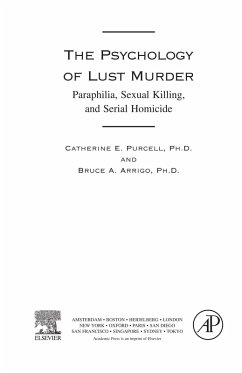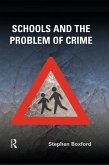The Psychology of Lust Murder systematically examines the phenomenon of paraphilia (i.e., aberrant sexuality) in relationship to the crime of lust murder. By synthesizing the relevant theories on sexual homicide and serial killing, the authors develop an original, timely, sensible model that accounts for the emergence and progression of paraphilias expressed through increasingly violent erotic fantasies. Over time, these disturbing paraphilic images that, among other things, involve rape, body mutilation and dismemberment, torture, post-mortem sexual intercourse, and cannibalism, are all actualized. Thus, it is the sustained presence of deviant sexuality that contributes to and serves as underlying motive for the phenomenon of lust murder (a.k.a. erotophonophilia). Going well beyond theoretical speculation, the authors (Dr. Catherine Purcell, a forensic psychologist and Dr. Bruce Arrigo, a criminologist) apply their integrated model to the gruesome and chilling case of Jeffrey Dahmer. They convincingly demonstrate where and how their conceptual framework provides a more complete explanation of lust homicide than any other model available in the field today. The book concludes with a number of practical suggestions linked to clinical prevention, diagnosis, and treatment strategies; police training, profiling, and apprehension efforts; as well as legal and public policy responses to sexually violent and predatory assailants. Comprehensive in its coverage, accessible in its prose, and thoughtful in its analysis,
The Psychology of Lust Murder is a must read for any person interested in the crime of erotophonophilia and those offenders responsible for its serial commission.
- Contributes, in a thoughtful and scholarly way, to the audiences' existing library of books on crimes and criminals
- Provides new and insightful information on the criminal behavior of Jeffrey Dahmer
- Enables readers to compare and contrast different models/theories on sexual homicide and serial murder
- Assists researchers, educators, public officials, and the lay public determine how best to respond to the phenomenon of lust murder
Dieser Download kann aus rechtlichen Gründen nur mit Rechnungsadresse in A, B, BG, CY, CZ, D, DK, EW, E, FIN, F, GR, HR, H, IRL, I, LT, L, LR, M, NL, PL, P, R, S, SLO, SK ausgeliefert werden.









